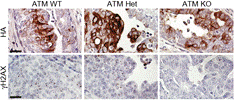Veterinary and Biomedical Sciences, Department of
Document Type
Article
Date of this Version
2013
Citation
Published in Journal of Cardiovascular Translational Research, doi: 10.1007/s12265-013-9519-3
Abstract
Heart disease, the leading cause of death in humans, is estimated to affect one in four American adults in some form. One predominant cause of heart failure in young adults is myocarditis, which can lead to the development of dilated cardiomyopathy, a major indication for heart transplantation. Environmental microbes, including viruses, bacteria, and fungi that are otherwise innocuous, have the potential to induce inflammatory heart disease. As the list is growing, it is critical to determine the mechanisms by which microbes can trigger heart autoimmunity and, importantly, to identify their target antigens. This is especially true as microbes showing structural similarities with the cardiac antigens can predispose to heart autoimmunity by generating cross-reactive immune responses. In this review, we discuss the relevance of molecular mimicry in the mediation of infectious myocarditis.



Comments
Copyright © 2013 Springer Science+Business Media, New York.